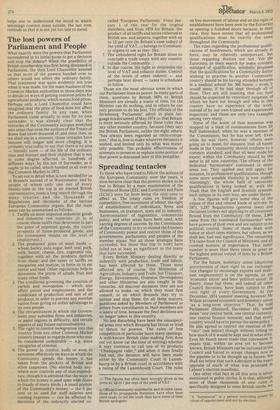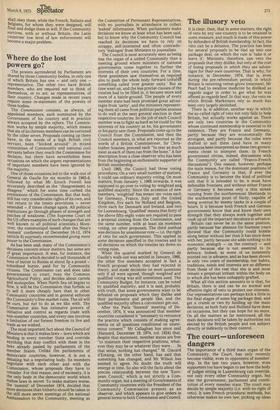Spreading tentacles
To those who have tried to follow the actions of the European Community over the years, it soon became clear that the powers shown to be lost to Britain by a mere examination of the Treaties of Rome (EEC and Euratom) and Paris (ECSC) were far from being the only ones to affect us. The treaty rules on freedom of competition, free movement of labour, the right of establishment of individuals, firms and businesses, on transport, state aid to industry, 'harmonisation' of legislation, commercial policy, and other areas have been used, with varying degrees of success, by the Commission of the Community to try to extend the frontiers of Community power and restrict those of the governments, parliaments and peoples of the member states. Not all those attempts have succeeded, but those that (up to now) have failed are at least as significant as the many that have succeeded.
Every British Ministry dealing directly or indirectly with production, trade and labour, has been affected by these. Those most affected are, of course, the Ministries of Agriculture, Industry and Trade, but Transport, Energy, Environment, Overseas Development and other Ministries are also caught in the tentacles. All discover decisions they are not allowed to make, on which they must first consult, or on which Brussels may try to pursue and stop them. On all these matters, questions asked by Members of Parliament or letters from constituents to their members are a waste of time, because the final decisions are no longer taken in this country.
No less disturbing have been the unsuspected areas into which Brussels has thrust or tried to thrust its powers. The rules of free competition in particular leave many openings. A well-known British cider-making firm does not yet know (at the time of writing) whether it may continue to call one of its products "Champagne cider," and when it does finally.
find out, the decision will have been made either by the Community Court in Luxem bourg or by a British court in accordance with a ruling of the Luxembourg Court. The rules on free movement of labour and on the right of establishment have been seen by the Eurocrats as opening a hundred doors because, in their view, they have meant that all professional qualifications must be exactly the same throughout the Community. , The rules regarding the professional qualifications of hairdressers, which are already in force, may be relatively unimportant, but those regarding doctors are not. Yet. the Eurocrats, in their search for some common standard of qualification, solemnly proposed that the qualifications for a Community doctor wishing to practise in another Community country should be his having attended lectures in a medical school for 560 hours — even, it would seem, if he had slept through all of them. They are still insisting that our food should be inspected by veterinary surgeons, of whom we have not enough and who in this country have no experience of the work, instead of by our own trained and experienced inspectors; and those are only two examples among very many. Some of the worst of that nonsense was stopped by a blast of commonsense from Dr Ralf Dahrendorf, when he was a member of the Commission, but he has now left. Even while he was there, however, efforts were going on to insist, for instance, that all honey made in the Community should conform to a common standard, and that all beer made for export within the Community should be the same in all nine countries. The efforts of the dedicated `harmonisers' continued in other areas too. They applied and still apply, for instance, to professional qualifications, though some more sensible elasticity is now visible. Alarmingly, the whole field of university qualifications is being looked at, with the result that the English and Scottish systems, each unique in its own way, are under threat. A few figures will give some idea of the extent of that and related kinds of activity. In 1971, 3,287 Regulations (general laws) and Decisions (orders not applying to all countries) flowed from the Community. Of these, 2,904 came from the nominated bureaucrats* who have powers of their own and are subject to no political control. Some of these dealt with minor or short-term matters, but others, as we shall see, had real significance. The remaining 374 came from the Council of Ministers, and all covered matters of importance. That latter number is more than three times as great as the highest annual output of laws by a British Parliament.
For the future, monetary union (depriving governments of their right to use exchangerate changes to encourage exports and maintain employment) is on the agenda, as are 'economic union' and later 'political union'. In theory, these last three, and indeed all other Council decisions, have been subject to the veto right of every Government. At the December, 1974 'summit' meeting, however, Mr Wilson accepted economic and monetary union "as a long-term objective." That, he told Parliament (Hansard, December 16), would mean "one central bank, one central currency. one central finance minister, and that every, country would have to pursue the same policy. He also agreed to restrict the exercise of the "veto" (see below) though without telling us how much of it would be kept and in what area. Even Mr Heath never made that concession. It means that, within an area yet to become known, British Ministers can be outvoted in the Council and forced to accept changes now in the pipeline or to be thought up in future. We shall see below that such a decision is the exact opposite of much of what was promised in Labour's election manifesto.
One other vital fact in all this area is never mentioned in polite circles. It is that, although none of these thousands of new rules is specifically designed to meet British needs, we shall obey them, while the French, Italians and Belgians, for whom they were designed, will flout and dodge them at will. If the Community survives, with or without Britain, the Latin countries' low level of law enforcement will become a major problem.











































 Previous page
Previous page